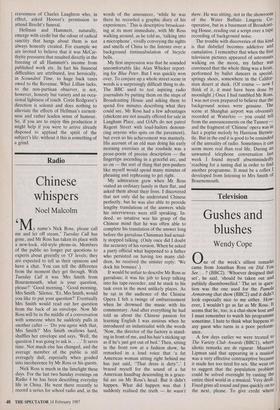Radio
Chinese whispers
Noel Malcolm
y name's Nick Ross, please call me and let off steam.' Tuesday Call has gone, and Mr Ross has taken its place with a new-look, old-style phone-in. Members of the public no longer put questions to experts about greenfly or '0' levels; they are expected to tell us their opinions and have a chat. You can tell the difference from the moment they get through. With Tuesday Call it was 'Mrs Smith from Bournemouth, what is your question, please?' Good morning.' Good morning, Mrs Smith.' Silence. 'Er, Mrs Smith, would you like to put your question?' Eventually Mrs Smith would read out her question from the back of an envelope. Now Mr Ross will be in the middle of a conversation with someone when he suddenly pulls in another caller — `Do you agree with that, Mrs Smith?' Mrs Smith swallows hard, shuffles her envelope and says, 'Well, the question I was going to ask is. . . .' It saves time. Not much else has changed, and the average member of the public is still averagely dull, especially when goaded into incoherence by Mr Ross or his guests.
Nick Ross is much in the limelight these days. For the last two Sunday evenings on Radio 4 he has been describing everyday life in China. He went there recently to record a series for school radio and, in the words of the announcer, 'while he was there he recorded a graphic diary of his experiences.' This is descriptive broadcast- ing at its most immediate, with Mr Ross walking around, as he told us, 'talking into a microphone', vividly conveying the sights and smells of China to the listener over a background tintinnabulation of bicycle bells.
My first impression was that he sounded uncomfortably like Alan Whicker report- ing for Blue Peter. But I was quickly won over. To conjure up a whole street scene in words is a surprisingly difficult thing to do. The BBC used to test aspiring radio journalists by putting them on the steps of Broadcasting House and asking them to spend five minutes describing what they could see. Mr Ross had a few advantages (chickens are not usually offered for sale in Langham Place, and OAPs do not patrol Regent Street with loud-hailers denoun- cing anyone who spits on the pavement), but even so his achievement was masterly. His account of an old man doing his early morning exercises at the roadside was a prose-poem of precise description — the fingertips ascending in a graceful arc, and so on — the sort of thing that pen-pushers like myself would spend many minutes of phrasing and rephrasing to get right.
My admiration grew when Mr Ross visited an ordinary family in their flat, and asked them about their lives. I discovered that not only did he understand Chinese perfectly, but he was also able to provide lengthy translations of the answers while his interviewees were still speaking. In- deed, so intuitive was his grasp of the Chinese mind that he was often able to complete his translation of the answer long before the garrulous Chinaman had actual- ly stopped talking. (Only once did I doubt the accuracy of his version. When he asked a party official what happened to a father who persisted on having too many chil- dren, he received the sinister reply: 'We dock his bonuses'.) It would be unfair to describe Mr Ross as garrulous; it was his job to keep talking into his tape-recorder, and he stuck to his task even in the most unlikely places. As he sat in the audience of the Chinese Opera I felt a twinge of embarrassment when he drowned the music with his commentary. And after everything he had told us about the Chinese passion for learning English I was anxious when he introduced an industrialist with the words `Now, the director of the factory is stand- ing in front of me, and his hair's sticking up as if he's just got out of bed.' Then, sitting in the front row at a fashion show, he remarked in a loud voice that 'a fat American woman sitting right behind me has just said, "That dress is dirty".' I braced myself for the sound of a fat American handbag descending in a grace- ful arc on Mr Ross's head. But it didn't happen. What did happen was that I suddenly realised the truth — he wasn't there. He was sitting, not in the showroom of the Water Buffalo Lingerie Co- operative, but in a basement of Broadcast- ing House, reading out a script over a tape recording of background noise. The trouble with discoveries of this kind is that disbelief becomes addictive and cumulative. I remember that when the first television pictures appeared of astronauts walking on the moon, my father was convinced that the whole thing was a hoax, performed by ballet dancers in special, springy shoes, somewhere in the Califor- nian desert at dusk. (Of course — now I think of it, it must have been done by moonlight.) Once I had rumbled Mr Ross, I was not even prepared to believe that the background noises were genuine. The scene at Shanghai airport was obviously recorded at Waterloo — you could tell from the announcements on the Tannoy — and the fragment of 'Chinese' opera was In fact a poplar melody by Harrison Birtwis- tle. But in the end it is good to be reminded of the unreality of radio. Sometimes it can seem more real than real life. During an unwanted telephone conversation last week I found myself absentmindedly 'reaching for a tuning dial in order to find another programme. It must be a reflex ! developed from listening to Mrs Smith of Bournemouth.


























































 Previous page
Previous page